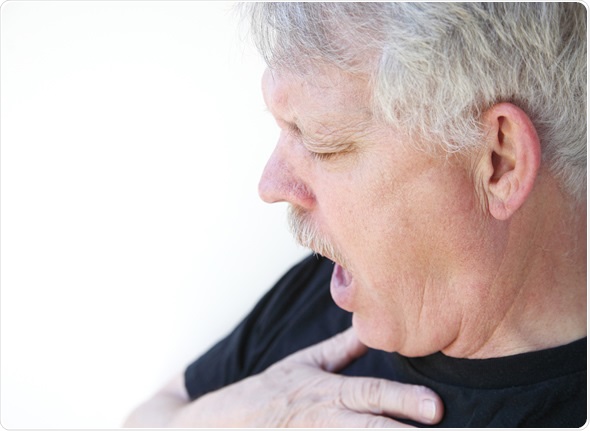There are various causes of shortness of breath, also sometimes referred to as breathlessness of dyspnea, which may result in difficulty breathing. Most commonly, there is an underlying medical condition of the respiratory or cardiovascular system involved, although there are several other possible causes.
When a patient presents wit shortness of breath, it is important to ask relevant questions and perform a physical examination to help determine the underlying cause and the appropriate treatment to manage this. It is normal to feel some shortness of stress with greater physical exertion than usual, but it can become a problem when normal daily tasks induce symptoms.
Shortness of breath may present in an acute episode or on a chronic basis, depending on the cause of the condition. For example, an asthma or anxiety attack may precipitate severe symptoms quickly, which then subside over time. Other patients may notice ongoing problems with the breathing, due to chronic causes such as obesity or heart disease.

Respiratory Causes
The respiratory system plays an essential role in the breathing and supply of oxygen to the body, and there are various diseases of the lungs and respiratory system that may cause shortness of breath. These may include:
- Airway obstruction
- Asthma, often triggered by a viral infection or allergies
- Chronic obstructive pulmonary disease (COPD)
- Infections (e.g. pneumonia, bronchiolitis, tuberculosis)
- Lung cancer
- Pulmonary embolism
- Pulmonary hypertension
- Scarring or other damage to the lung tissue
- Sinus congestion
Depending on the cause, the symptoms may be acute or chronic.
Cardiovascular Causes
The cardiovascular system is closely linked to symptoms of shortness of breath, as it is the blood that is responsible for carrying oxygen from the airways to where it needs to be in the body. When the body lacks oxygen, symptoms of shortness of breath can develop to increase the delivery of oxygen to the blood.
Causes of shortness of breath relating to the heart may include:
- Angina
- Arrhythmia
- Coronary artery disease
- Enlarged heart
- Heart failure
- Myocardial infarction
- Structural damage to the heart muscles or valves
Each of these causes has an effect on the delivery of oxygen to the body via the blood, which can cause patients to breath more rapidly or feel out of breath. Identifying and addressing the underlying cause is the most practical course of action in this instance.
Other Causes
In addition to the respiratory and cardiovascular causes, there are several other reasons that may be responsible for shortness of breath.
Compression of the chest wall that restricts normal airflow into the lungs is a common factor. This may be due to fractured ribs surrounding the lungs, excess weight in obese individuals, or spatial changes as the fetus grows during pregnancy.
The environment can also cause shortness of breath. In particular, individuals climbing to high altitudes may notice shortness of breath as a result of the lower oxygen content in the air, in comparison to lower altitudes where they usually reside. Dust is the air can also irritate the respiratory system and cause symptoms.
Other causes of shortness of breath may include:
- Allergies, particularly in association with asthma
- Anemia due to insufficient transportation of oxygen around the body
- Anxiety, emotional distress or panic attack
- Diabetic ketoacidosis
- Pain
- Thyroid hormone imbalances
In some cases, certain medications may also cause shortness of breath as a side effect of the mechanism of action.
References
- https://www.chestnet.org/Foundation/Patient-Education-Resources/Shortness-of-Breath/Causes
- http://patient.info/health/breathlessnessbreathing-difficulties
- https://www.nlm.nih.gov/medlineplus/ency/article/003075.htm
- http://circ.ahajournals.org/content/108/2/e11.full
- http://www.nhs.uk/Conditions/shortness-of-breath/Pages/Introduction.aspx
Further Reading
- All Breathing Content
- Breath-Holding Spells in Children
Last Updated: Jun 26, 2019

Written by
Yolanda Smith
Yolanda graduated with a Bachelor of Pharmacy at the University of South Australia and has experience working in both Australia and Italy. She is passionate about how medicine, diet and lifestyle affect our health and enjoys helping people understand this. In her spare time she loves to explore the world and learn about new cultures and languages.
Source: Read Full Article






